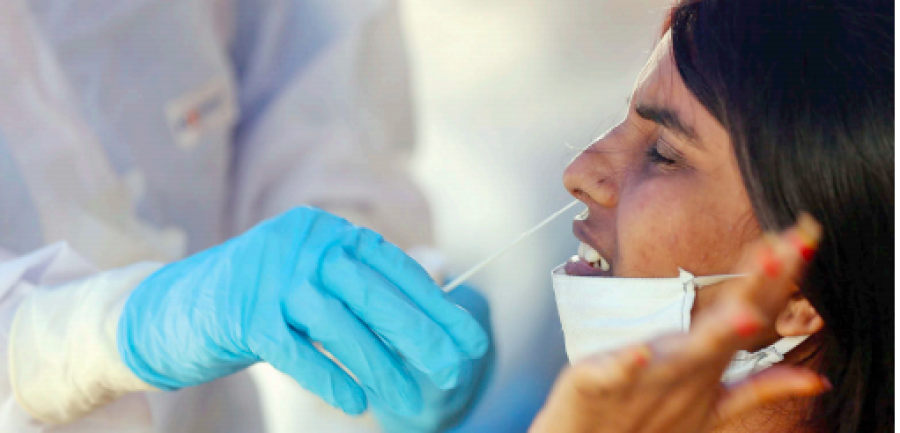National
More Indian nationals are seeking Covid-19 tests in Kathmandu post lockdown
The Health Ministry starts collecting random samples of people entering Kathmandu Valley, but public health experts stress mandatory tests for all travellers.
Arjun Poudel
The number of Indian nationals seeking coronavirus tests in Kathmandu have risen several fold after the lockdown was lifted, according to the Sukraraj Tropical and Infectious Disease Hospital.
According to the hospital, around 120 to 150 Indian nationals are seeking tests every day, which was 20 to 30 prior to ending the lockdown.
Over 1,200 people have been visiting the hospital daily for polymerase chain reaction (PCR) tests. Of them, 10 to 15 percent are from the Indian states of Bihar, Uttar Pradesh and Rajasthan, according to the hospital administration.
Five people tested positive for coronavirus infection in Kathmandu on Sunday. All five of them had come from India after the government lifted the lockdown on July 21, according to Sukraraj hospital.
“The five Indian nationals had come to Nepal to do business. They have been undergoing treatment in the hospital after their test results came positive,” Dr Sagar Rajbhandari, the hospital director, told the Post.
The government has been claiming that it has restricted land crossings and prevented foreign nationals from entering the country even though the lockdown has ended. The rise in the number of Indian nationals seeking tests, however, suggests otherwise.
Meanwhile, the Health Ministry has started collecting random samples of people entering Kathmandu Valley via Nagdhunga and Sanga Bhanjyang entry points to study the infection rate among the people coming from other districts.
“We will contact those individuals whose test results come positive and trace their contacts here in the Valley as well as in their respective districts,” said Dr Jageshwor Gautam, spokesperson for the Health Ministry. “We will also ask all people entering the Valley to observe self quarantine.”
Dr Sameer Kumar Adhikari at the ministry told the Post that the target is to collect 10,000 samples from the people entering the Valley from both the coronavirus hotspots and areas with low infection risk.
Public health experts however, say that the risk of coronavirus transmission communities will remain if people who are travelling from one place to another are let off without tests or mandatory quarantine.
“One could meet several people during their travel and if they are infected, they could transmit the virus to their family members and in the community,” said Dr Sher Bahadur Pun, chief of the Clinical Research Unit at Sukraraj hospital, emphasising compulsory coronavirus tests of people entering the Valley as well as those travelling from one place to another.
“Furthermore, for many working class people and those who rely on daily wages to survive, it is not possible for them to remain in isolation and not go to work.”
Many Indian nationals come to Nepal for jobs and to do business.
“We have prioritised testing of those people coming from India and from bordering districts of Nepal,” said Rajbhandari, the director of Sukraraj hospital. “We have been providing free tests even to foreign nationals to mitigate the infection risk here in our country.”
The Ministry of Home Affairs has said it has been allowing Indian nationals to enter Nepal, who work in hydel projects, construction sites, factories, medical colleges with recommendations from the concerned ministries.
“They had entered Nepal showing negative reports of polymerase chain reaction tests,” Kedarnath Sharma, spokesperson for the Ministry of Home Affairs, told the Post.
Sharma concedes that some people may have been entering the country illegally.
“To stem illegal border crossing, we have increased border outposts of the Armed Police Force,” Sharma said.
Cases of Covid-19 cases have been rising at an alarming rate across the southern borders with over 48,000 daily cases for the last four days. According to Johns Hopkins University, over 3,17,000 new cases were recorded in India in the past week alone.
“If the government cannot restrict the movement of people coming from across the border, it should at least ensure that they are strictly observing the 14-day quarantine rule,” Dr Mingmar Gyelgen Sherpa, former director general at the Department of Health Services, said. “Otherwise, there is a great risk of the disease spreading in several communities at once, and the situation could go beyond the capacity of our healthcare system.”




 9.7°C Kathmandu
9.7°C Kathmandu














